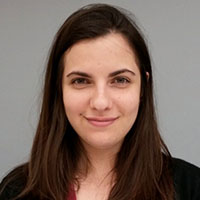

Email: hy434@cornell.edu
Position: Postdoctoral Research Associate
Current Institution: Columbia University
Abstract: Widely Tunable FDD Wireless: Challenges and Opportunities
The recent trend in proliferation of wireless devices coupled with upcoming 5G standards requiring rates of 100Gb/s has created an increasing need for high throughput wireless data. Spectrum has become an expensive resource: an FCC auction for a 4MHz bandwidth around the 700MHz generated $19B in 2008. There are only two ways to get around this scarcity: (1) exploring whitespace, i.e., geographically underutilized parts of the spectrum or (2) increasing spectral efficiency for a particular frequency bandwidth. Regarding (1), the FCC has adopted various strategies such as reverse-auctioning to buy unused TV bands, opening up spectrum in a fragmented fashion. Most current transceivers use fixed frequency elements such as high order filters or circulators, preventing them from taking advantage of frequency hopping. The way to take advantage of (2) involves duplex communication. While time division duplexing (TDD) is still widely in use, it is not optimal in terms of maximizing throughput. Frequency division duplexing (FDD) enables full data capacity for both transmit and receive, and FDD deployments can provide greater coverage and achieve cell edge rates further from the base station. However, an FDD capable radio has its own challenges. Self-interference cancellation (SIC) is required since the transmitter signal (>20 dBm) is trillions of times larger than the receiver sensitivity level (<-90 dBm) which can saturate or damage the receiver. We want to be able take advantage of both of these methods (frequency agility and duplexing): our goal is to build a software-defined, frequency tunable, and FD/FDD capable transceiver. We use a distributed transmission line based amplifier that has baseband gain and phase control to achieve SIC. Furthermore, we use a frequency selective source degeneration on the sub-PAs to mitigate the TX noise in the RX band.
Bio:
Hazal Juksel is currently a postdoctoral research associate in the CoSMIC Lab in the Electrical and Computer Engineering Department at Columbia. She received a master’s degree and a PhD in electrical and computer engineering (ECE) from Cornell in 2015 and 2018, respectively, and a bachelor’s degree in ECE from Duke in 2008. Her research focuses on biomedical applications of nonreciprocal duplexing networks. Her graduate research focused on the design and theoretical widely tunable, ultra flexible, software-defined duplexing transceivers. She also investigated the consequences of discontinuities of IV curves in device modeling. She was a Facebook PhD Research Fellowship Finalist in 2016 and received the Outstanding Teaching Assistant Award from Cornell ECE in 2018.

